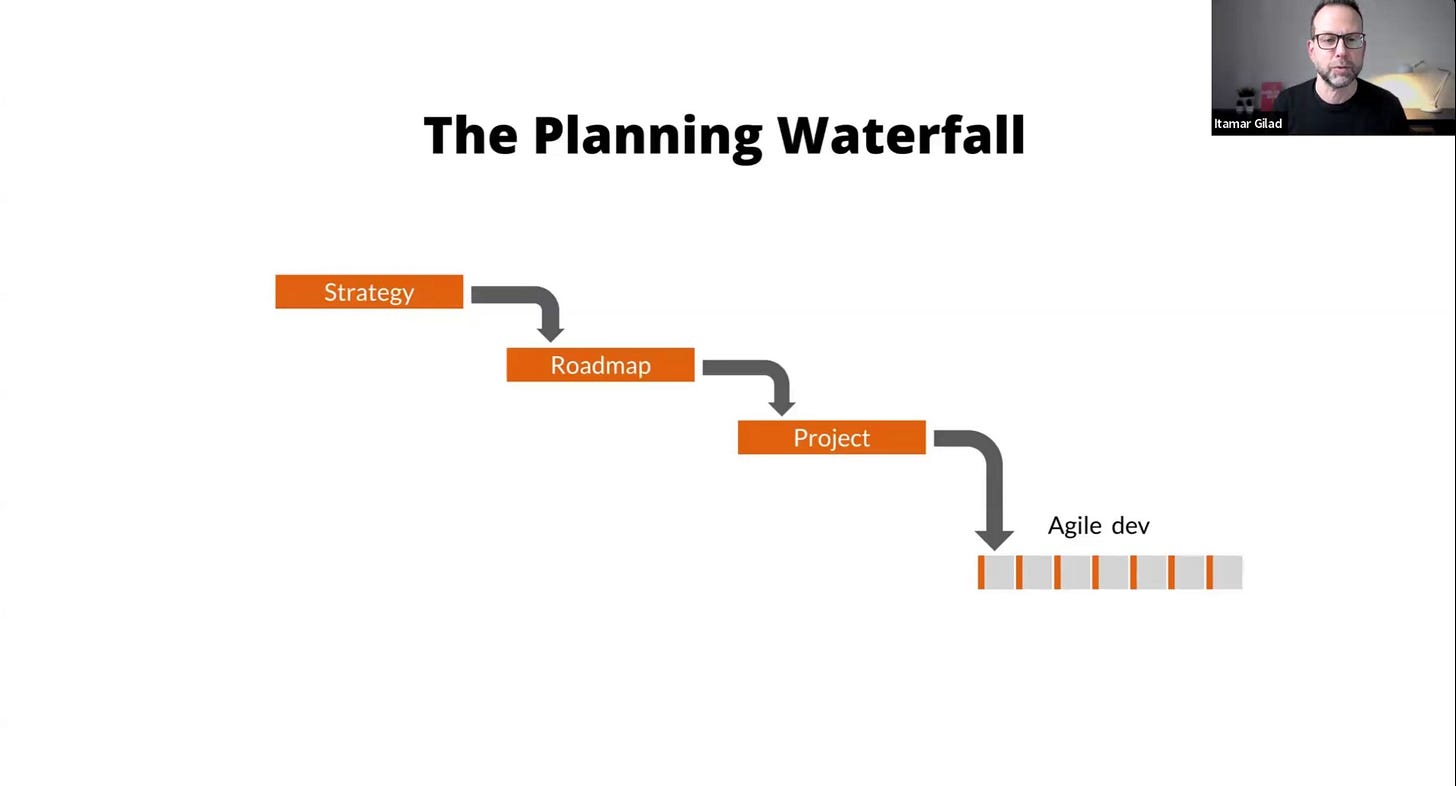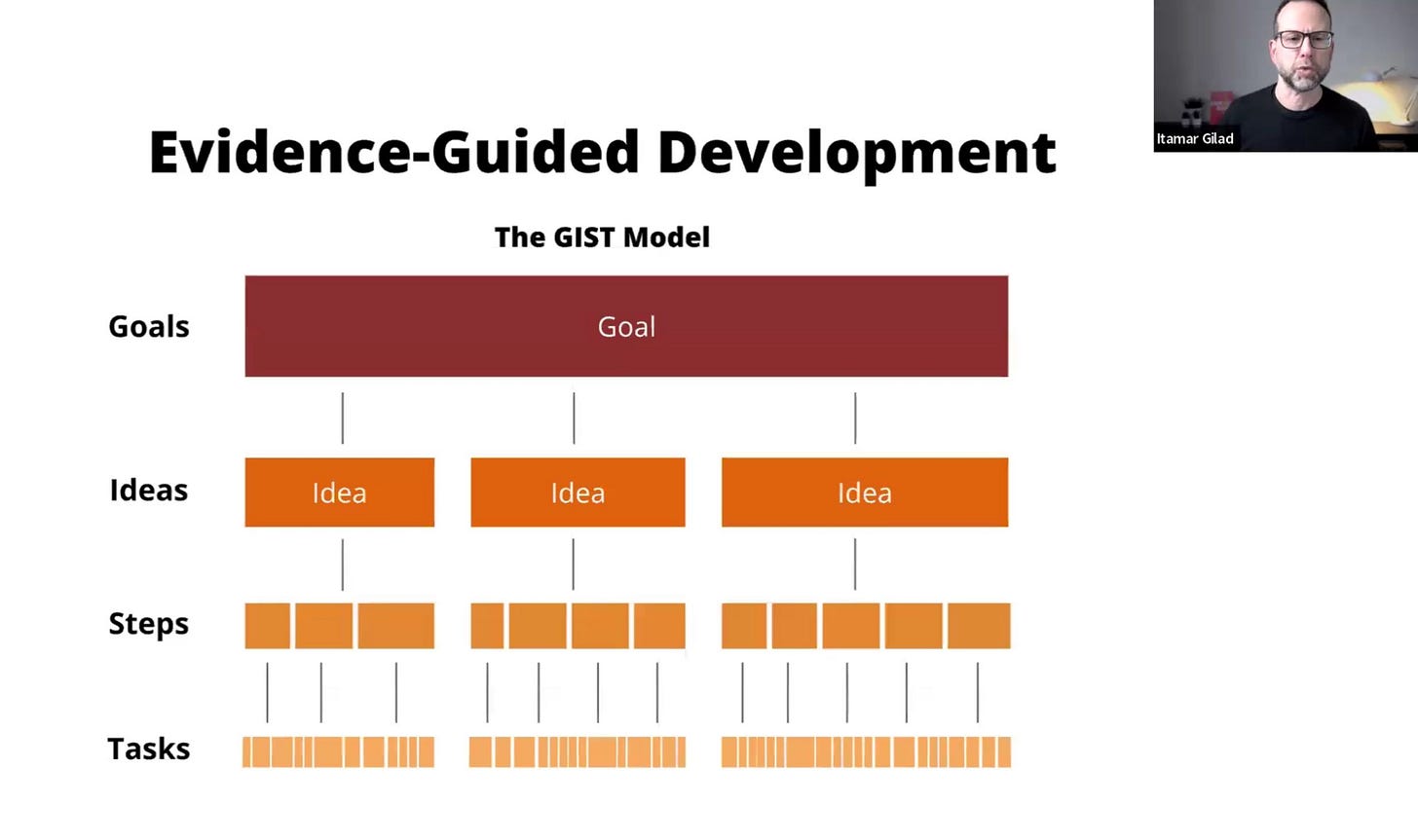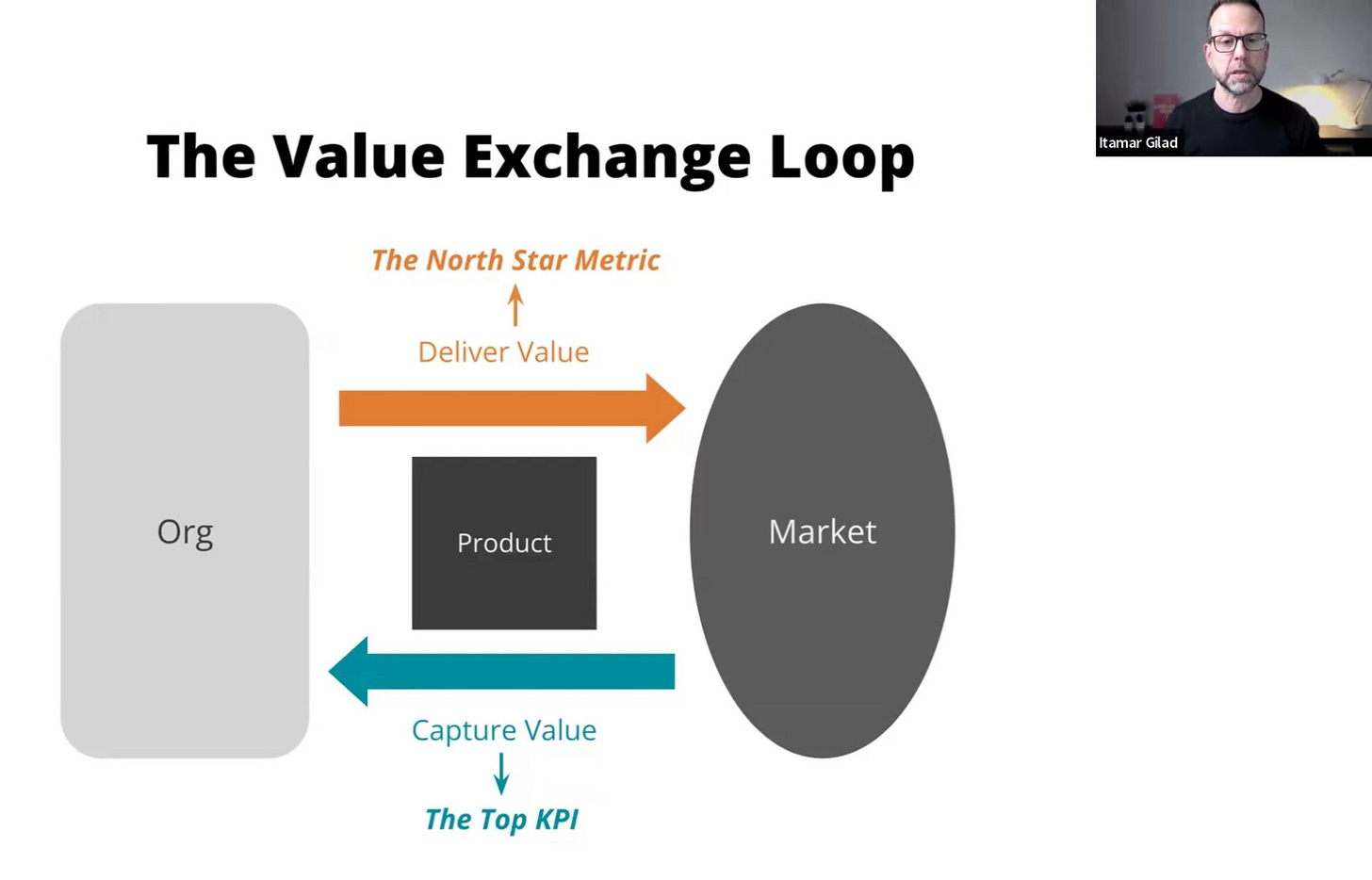💡Product Circle ⭕ Chat - Evidence-Guided Product Development with Itamar Gilad
💡 Product Circle ⭕ Chat 41 with Itamar Gilad – Learn before launching with the Confidence Meter and the GIST framework
💡Product Circle⭕ Chat runs every second week as a Zoom call that anyone can join to talk all things product, product management and problem solving. Creating value for customers and the business.
Best of all, when you attend live, you receive goodies like free courses and decks (like Janna Bastow provided), a free book (like Rich Mironov, Roman Pichler and others provided), access to their course for free (like John Cutler provided) and many more.
Don’t forget to follow the 💡Product Circle ⭕ Chat calendar on Luma and register for our next talk on 💡 Product Circle ⭕ Chat - Building Delightful Products with Nesrine Changuel on April 23
Become Irreplaceable in 2025
Before we get to Itamar’s talk (and recording) below, I’d like to share with you a great courses I’m running. Both virtually and both based on my 20+ years in Product Management.
Product Growth Masterclass: Build a Growth Engine That Scales
🔥 Struggling to grow your product? Want to grow acquisition—without relying on expensive ads?
The secret? Growth is built into the product—not just marketing.
📅 Live, after work | 3 days | Starts end of April
In this Product Growth Masterclass, you'll discover how to:
Design a customer journey that drives engagement, retention, and referrals
Use behavioral psychology to create habit-forming product experiences
Implement growth loops that turn users into loyal advocates
Identify and remove friction from key moments in your user journey
Reduce churn and increase retention using proven frameworks
Track the right metrics at each stage of your product’s growth
Plus, you get the recordings, the slides and a certificate upon completion.
💡 Stop guessing. Start growing. Reserve your spot now!
Now let’s get back to Itamar’s talk on Evidence-Guided Product Development.
"Evidence is a foundational element of science, medicine, and law, yet in product development opinions and consensus still rule supreme." - Itamar Gilad
This 💡Product Circle⭕ Chat was run on the 26 March 2025 at 7pm (AEST) / 9am (Barcelona time) with Itamar Gilad.
Recording below👇🏼
💥 Why Product Needs Evidence, Not Opinions
We’ve all been there.
A roadmap packed with “must-have” features. A backlog that keeps growing. Endless debates about what to build next—fueled by gut instinct, stakeholder pressure, or the loudest voice in the room.
Sound familiar?
That’s the exact problem we tackled with Itamar Gilad—former Google PM, product coach, and author of Evidence-Guided. What unfolded was an energising, honest conversation about what’s broken in product decision-making… and how we can fix it.
🧠 The Roadmap Isn’t the Strategy
One of the big myths debunked? That detailed planning equals progress.
Most teams are stuck in a "planning waterfall" — building long-term strategies that are really just glorified roadmaps, packed with assumptions. Then they switch gears and claim to be agile in delivery. But when you're locked into a plan made months ago, how agile are you really?
The truth is: we’re overplanning and underlearning.
Even worse, we’re often working on things that don’t move the needle.
If you’ve ever launched a feature that landed with a thud, you’re not alone. Most ideas don’t deliver the impact we expect.
So what’s the alternative?
🔎 From Gut Feel to Confidence
Evidence-guided product development—a mindset (and methodology) that puts learning before launching.
🧩 From Ideas to Impact: The GIST Framework
Itamar introduced us to his GIST framework—a lightweight structure for aligning teams around value, not output
Goals
Everything starts with clear, measurable goals—not features or roadmaps. GIST encourages teams to define goals around value delivered to customers (like a North Star Metric) and value captured by the business (like revenue or retention).
These goals are grounded in real customer and business models, not just OKRs for the sake of tracking. Itamar emphasised that many teams operate in a “vacuum of goals,” where they use the roadmap as a proxy, which leads to misalignment and wasted effort.
Goals are about the Value Exchange Loop.
Product is a vehicle for value. Value for the Business (the North Star Metric) and value for the end user (KPI).
An example of the North Star Metric for Whatsapp is the number of sent messages or for Amplitude, the Weekly Learning Users (or the weekly active users that find an insight in the tool that they share).
Ideas
Ideas are not plans—they’re hypotheses.
In GIST, teams treat ideas as possible ways to achieve goals. Rather than prioritising based on gut feel or stakeholder pressure, teams use structured evaluation (like the Confidence Meter) to assess each idea’s potential impact, ease, and level of supporting evidence.
This helps reduce risk and focus attention on ideas most likely to succeed.
(The confidence meter is explained below)
Steps
Steps are small experiments or validation activities designed to generate evidence. This could include interviews, usability tests, fake doors, Wizard of Oz prototypes, or data analysis.
The goal is to learn quickly and cheaply before committing to full delivery. Evidence from each step helps teams decide whether to move forward, pivot, or park an idea.
Tasks
Only once an idea has gathered enough supporting evidence does it move into execution. Tasks are your typical agile delivery work—user stories, tickets, backlog items. The key difference is that everything built is traceable back to a validated idea and a measurable goal.
Why GIST Works
GIST helps teams align around what matters, avoid building ideas based on assumption, make smarter decisions with less waste and build trust with stakeholders through transparency and evidence.
It’s deceptively simple, but powerful. Especially when paired with the Confidence Meter, GIST turns idea overload into a system for learning what works—without burning through time, money, or trust.
💙The Heart of Evidence Guided Development: The Confidence Meter
At the heart of it is the Confidence Meter: a simple, colourful tool that helps you assess ideas based on the strength of evidence behind them—not opinion, not enthusiasm, not who’s asking.
What is the Confidence Meter?
The Confidence Meter is a tool designed to help product teams assess how much evidence they have to support an idea — before they invest in building it.
Rather than relying on gut feel, opinions, or pressure from stakeholders, the Confidence Meter gives a structured way to evaluate an idea's strength based on how much supporting evidence exists.
It helps answer the question: “How confident are we that this idea will have the impact we expect?”
Why It Matters
In product development, most ideas sound good in theory — but many fail to deliver real value.
Industry data shows less than 1 in 3 ideas tested at companies like Microsoft and Google deliver measurable positive results.
Teams often prioritise ideas based on opinions, not validation — wasting time and resources.
The Confidence Meter helps shift from opinion-led decisions to evidence-guided thinking.
📊 Data-Driven vs. 🔍 Evidence-Guided
“Data-driven” is often misunderstood. Many teams think being data-driven means looking at dashboards, tracking usage, or reporting KPIs. But Itamar pointed out:
🧠 "Being data-driven often turns into being overwhelmed by data—without knowing what to do with it."
It’s reactive. It’s backward-looking. And it doesn’t always help us make better decisions.
On the other hand, evidence-guided is about proactively seeking the data you need to test assumptions, validate ideas, and build confidence.
🔍 "Evidence-guided means mixing your judgment with structured learning—actively generating the evidence you need to make smarter calls."
Imagine going to the doctor with a painful headache. They take one look at you and without running any tests, conclude that you have a brain tumor and need immediate surgery.
Of course, you wouldn’t trust that doctor.
Why?
Because in medicine, we expect professionals to gather evidence—run tests, do scans, ask questions—before jumping to conclusions.
“So why in product management do we jump straight from symptoms to solutions—without collecting evidence first?”
In science, medicine, and law, evidence is non-negotiable. But in product? Too often, we rely on assumptions, opinions, and “gut feel.”
Instead of asking:
“What does the data say?” We start with:
“What do we believe? And how can we test if it’s true?”
🚨 Most Ideas Will Fail (and That’s OK)
A key insight from the session: even the best companies see most of their ideas flop in testing. Microsoft? ~33% success rate. Airbnb? Under 15%. So if you’re batting 100%, you’re probably not testing hard enough.
The takeaway? Failure isn’t the problem—building without learning is.
It’s not about betting on perfect ideas. It’s about creating a system where teams can run small, smart experiments to uncover what works before committing big.
🤝 Evidence Builds Trust (and Culture)
This isn’t just about frameworks or metrics. It’s about reshaping how teams work.
When goals are clear, ideas are tested, and results are shared transparently—something shifts. Teams stop working in silos. Stakeholders stop micromanaging. And everyone starts pulling in the same direction.
It’s not easy. It’s a cultural transformation.
But as Itamar reminded us, it’s far more efficient than launching features that don’t land.
💥 TL;DR
Building impactful products isn't about being right.
It’s about being curious enough to test, humble enough to learn, and disciplined enough to focus on what really matters.
✅ Most product decisions are based on gut feel—not data
✅ The Confidence Meter helps teams evaluate ideas based on real evidence
✅ The GIST framework (Goals, Ideas, Steps, Tasks) offers a clear, test-learn-adapt cycle
✅ Most ideas will fail—but that’s not failure if you learn early
✅ Culture trumps process—evidence builds trust, alignment, and impact
Get Itamar’s book 📘“Evidence Guided. Creating High-Impact Products in the Face of Uncertainty”, 🧰 Download his resources or 🧑💻 Join his next workshop
Product Circle Chat 41 - Topic
Topic: Evidence-Guided Product Development
In the past few decades, tech design and development have made incredible strides, yet product management hasn’t evolved as much. We still rely heavily on untested ideas, guided by opinions, consensus, and rank rather than evidence.
In this session, Itamar Gilad will introduce evidence-guided alternatives to outdated practices like roadmaps and backlogs. He’ll share the Confidence Meter, a tool to evaluate ideas based on evidence, and explain how it can improve the quality of team discussions and decisions.
Explore what leadership looks like when opinions carry less weight, and how empowering teams with evidence builds trust and drives better outcomes. Itamar will also discuss the evolving role of product managers in this brave new world.
Product Circle Chat 41 - Video
Product Circle Chat 41 - Speaker
Itamar Gilad is a coach, author, and speaker, specializing in evidence-guided product management and strategy. With over two decades of experience at companies like Google, Microsoft, and startups, he’s made significant contributions to the field.
At Google, Itamar worked at YouTube and led parts of Gmail. He is the author of the book Evidence-Guided: Creating High-Impact Products in the Face of Uncertainty and is known for developing frameworks like GIST and the Confidence Meter.
He publishes a popular product management newsletter and offers free templates, eBooks, and resources on his website.
Links:
Product Circle Chat - Q&A
❓ How do I get involved?
1. Subscribe to the Product Circle Chat Calendar on Lu.ma and get notified of every 💡 Product Circle ⭕ Chat event
2.Register & Show up - Register to the Product Circle Chat event, block your calendar out and come to the next Chat 📅
3. Share - bring a friend or two who wants to talk all things Product 👯♂️👯♀️
4. Volunteer - volunteer to host or present at one of the future Product Circle Chats 🙋♀️. Drop me an email at irene@phronesisadvisory.com
❓ Will there be more sessions?
Yes. Fortnightly. Every second week.
❓ What if I can’t make the next session or don’t want to miss the next Product Circle chat invite?
Really want to come to the session but 😭 can't make this specific 💡 Product Circle ⭕ Chat?
📆 Get an invite directly into your inbox
👉 Subscribe to the Product Circle Chat Calendar on Lu.ma and get notified of every 💡 Product Circle ⭕ Chat event
💪 We've got you!
❓ Still have Questions?
Talk to me. Send me an email at irene@phronesisadvisory.com
Are you new to Product Management and want to learn from me?
I created a Course. For people new to Product Management.
Aligned it with the Learning Outcomes created by Product greats like Jeff Patton and others. Had it certified by the globally recognised ICAgile.
Choose to spend 2 days learning from me - either face to face or via Zoom - with ICAgile Certified Professional in Product Management (ICP-PDM).
And if you’re looking for a sneaky discount, send me an email at irene@phronesisadvisory.com







